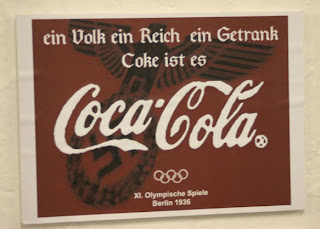Part One: From Rugby to Berlin
The modern Olympic Games have their origins
in a particular vision of the social role of sport, common among Europe ’s elites in the nineteenth century, which saw
sport as a part of a broader social trend towards a muscular Christianity. This
vision was encapsulated in the book Tom
Brown’s School Days, which celebrated the tenure of Thomas Arnold at Rugby , a prestigious private school in Warwickshire which
is, of course, the origin of the eponymous football code (an Olympic sport
until 1924, and again from 2016 in its seven-a-side form). The book was popular
across the British Empire, but it also found an audience in France
The founder of the modern Olympic movement,
Baron Pierre de Coubertin, came from a noble family but was part of a milieu of
right-of-centre republicans dedicated to reforming France Germany Europe ’s aristocrats.
Baron
de Coubertin: anglophile extraordinaire.
European elites at the time usually viewed
sport as an activity to be enjoyed exclusively by themselves, and to this end,
made use of various restrictions to prevent the working class from getting
involved. The centrepiece of this class apartheid was the insistence on
amateurism. When workers in Lancashire and Yorkshire
began taking to rugby, for example, the sport’s rulers were hostile. They had
seen what had transpired in soccer, where tolerance of professionalism had
allowed northern clubs to win multiple FA Cups and then to form a professional
league. When simply banning player payments didn’t work, the authorities tried
banning the collection of gate takings and banning the playing of ten-a-side
and twelve-a-side games until their intransigence caused the schism of 1895,
which divided their sport into (amateur, southern, and elitist) union and
(professional, northern, and democratic) league.
Other sports were just as prone to elite
attempts at class cleansing. In mid-nineteenth-century England Lincolnshire
Even though historians have unearthed
quotes which show that Coubertin was not staunchly opposed to professionalism,
his movement certainly was. After winning gold medals for the United States
The Olympic movement’s self-image, and the
contradictions abundant therein, were perhaps best captured in the 1981 film Chariots of Fire. Released
in the same year that the Olympics were opened to professional athletes, it
tells the story of a group of British runners competing in the 1924 Games in Paris , and glorifies the self-sacrifice of amateur
athletes (all of whom come from privileged enough backgrounds to attend Cambridge China Britain
When Baron de Coubertin established the
IOC, its mode of governance (a self-appointing global committee of dignitaries)
and its location in famously neutral Switzerland Berlin
An
early example of Olympic commercialisation: “one people, one Reich, one drink”.


No comments:
Post a Comment